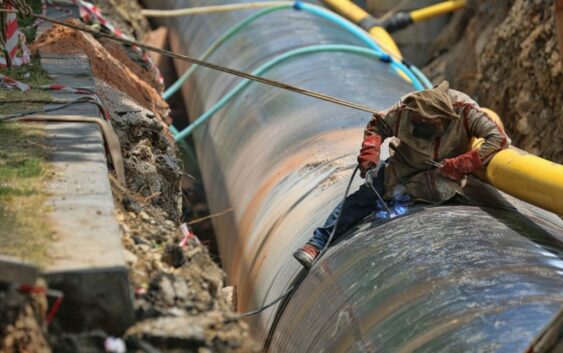NIGERIA-MOROCCO GAS PIPELINE TO BOOST NORTH WEST AFRICAN ZONE

Amina Benkhadra, general director of the National Hydrocarbons and Mines Office (ONHYM), outlined the importance of the Nigeria-Morocco gas pipeline and its potential contribution to the emergence of an integrated North West African zone.
Speaking during a panel as part of the second conference of member countries of the sedimentary Basin, dubbed the “MSGBC Oil, Gas & Power” conference on Thursday in Dakar, Benkhadra emphasized that the Morocco-Nigeria gas pipeline is a “structuring project with multiple goals.”
For the ONHYM chief, the pipeline will not only contribute to the emergence of an integrated North West African zone but will also increase much-needed access to energy in Western Africa.
The pipeline also seeks to create a competitive electricity market and contribute to the industrial and economic development of domestic sectors, including agriculture, industry, and mining.
Benkhadra recalled that the project will cross 13 countries along the Atlantic coast, with the ambition of benefiting 340 million inhabitants.
Speaking on Africa’s assets, the ONHYM expert emphasized that the continent has diversified available resources to turn itself into a model of sustainable development.
“This continent has immense potential in renewable energies and gas which remains untapped,” Benkhadra said,” stressing the need for large-scale investment in the regional energy sector to generate social and economic development.
“Total climate finance is estimated between $4.76 and 4.84 billion over the period 2022-2025, representing an annual flow of $163.4 to $173 billion,” she argued. Morocco will host 1,672 kilometers of the 4,000-kilometer-long Nigeria-Morocco gas pipeline project.
The pipeline is set to transport as much as 5.4 million cubic meters of gas to Morocco annually. The number is expected to represent almost half of Morocco’s gas imports in 2017.
The pipeline is set to help Morocco overcome its persistent energy crisis, currently relying on 90% of its energy from abroad, and minimize its energy imports from partners.
The North African country has been witnessing a significant increase in energy prices triggered by the global context, particularly the Ukraine-Russia conflict and COVID-19-related disruptions.
Algeria’s decision to end the Europe-Maghreb contract in October 2021 also pushed Rabat to look for alternatives to secure self-sufficiency in terms of energy.
SOURCE: MoroccoWorldNews

